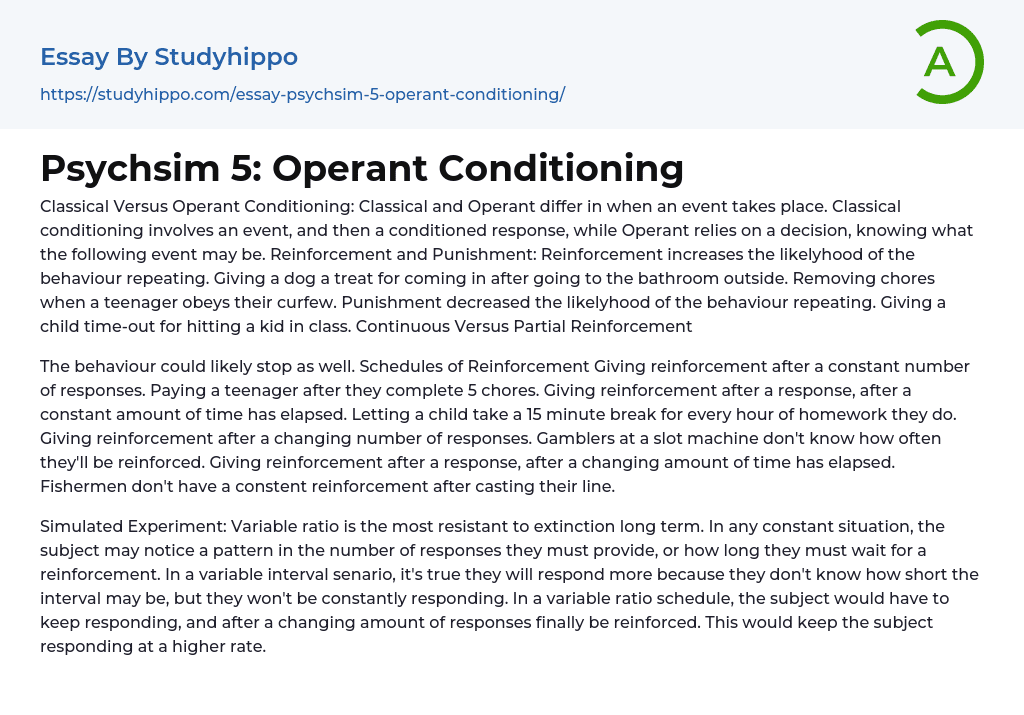Classical conditioning and operant conditioning differ in the timing of events. Classical conditioning involves an event followed by a conditioned response, while operant conditioning relies on a decision based on anticipation of the subsequent event.
Reinforcement and punishment play a role in both types of conditioning. Reinforcement increases the probability of a behavior recurring, such as giving a dog a treat for coming inside after going to the bathroom outside or removing chores as a reward for a teenager obeying curfew. On the other hand, punishment decreases the likelihood of a behavior recurring, such as giving a child a time-out for hitting another child in class.
There is also a distinction between continuous and partial reinforcement.
The behavior might also come to a halt. There are different schedules of reinforcement. On
...e is giving reinforcement after a constant number of responses, such as paying a teenager after they complete 5 chores. Another schedule is giving reinforcement after a response, but only after a constant amount of time has passed, like letting a child take a 15-minute break for every hour of homework they do. There is also giving reinforcement after a changing number of responses, as seen with gamblers at a slot machine who do not know when they will be reinforced. Lastly, there is giving reinforcement after a response, but the amount of time elapsed before reinforcement changes, as with fishermen who do not have a constant reinforcement after casting their line.
The most resistant to extinction long term is the variable ratio in a simulated experiment. In a constant situation, the subject may observe a pattern in the number of responses or the wai
time for reinforcement. While in a variable interval scenario, the subject will respond more due to uncertainty about the interval length but not continuously. However, in a variable ratio schedule, the subject has to keep responding and is reinforced after a changing number of responses. Consequently, the subject maintains a higher response rate.
- Research Methods essays
- Experiment essays
- Hypothesis essays
- Observation essays
- Qualitative Research essays
- Theory essays
- Explorer essays
- Abnormal Psychology essays
- Abraham Maslow essays
- Attachment Theory essays
- Authority essays
- Behaviorism essays
- Classical Conditioning essays
- Cognitive Psychology essays
- Counseling essays
- Developmental Psychology essays
- Educational Psychology essays
- Erik Erikson essays
- Family Therapy essays
- Jean Piaget essays
- Maslow's Hierarchy Of Needs essays
- Mental Health essays
- Operant Conditioning essays
- Personality Psychology essays
- Positive Psychology essays
- Psychoanalysis essays
- Psychotherapy essays
- Sigmund Freud essays
- Social Psychology essays
- Stanford Prison Experiment essays
- Supersize Me essays
- Adult essays
- Aggression essays
- Altruism essays
- Archetype essays
- Behavior essays
- Certainty essays
- Conformity essays
- Deception essays
- Human Behavior essays
- Human Sexuality essays
- Maturity essays
- Morality essays
- Obedience essays
- Procrastination essays
- Reinforcement essays
- Role Model essays
- Agriculture essays
- Albert einstein essays
- Animals essays




